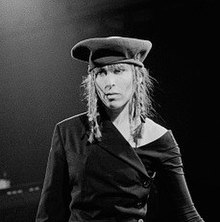Annette Peacock (born 1941)[1][2] is an American composer, musician, songwriter, producer, and arranger. She is a pioneer in electronic music who combined her voice with one of the first Moog synthesizers in the late 1960s.
Quick Facts Background information, Born ...
Annette Peacock |
|---|
 |
|
| Born | 1941 (age 82–83)
Brooklyn, New York City, U.S. |
|---|
| Genres | Free jazz, avant-garde jazz, electronic, art rock |
|---|
| Occupation(s) | Composer, musician, songwriter, producer, arranger |
|---|
| Instrument(s) | Vocals, synthesizer, keyboards |
|---|
| Years active | 1960s–present |
|---|
| Labels | ironic US, ECM, RCA, Sony, BMG |
|---|
|
| Website | www.annettepeacock.com |
|---|
Close
Annette Peacock was writing music by the time she was four years old. She is self-taught except for her time as a student at The Juilliard School in the early 1970s.[3] She grew up in California.[4]
Nee Coleman, she moved to New York to marry jazz bassist Gary Peacock in 1960.[4] During the early 1960s, she was an associate and guest of Timothy Leary[3] and Ram Dass at Millbrook, and was among the first to study Zen Macrobiotics with Michio Kushi, a discipline she continues to uphold. Peacock toured Europe with avant-garde jazz saxophonist Albert Ayler[3][4] while she was married to Gary Peacock, then pianist Paul Bley.[5][6] Her compositions appeared on Bley's album Ballads and influenced the style of ECM Records.[4] She was a pioneer in synthesizing electronic vocals after having been given a prototype of the first designed Moog synthesizer by its inventor, Robert Moog.[3]
She performed with the Bley-Peacock Synthesizer Show at New York's Town Hall in November 1969 and the next month at Philharmonic Hall which she promoted with late-night TV ads and an appearance on The Johnny Carson Show.[7] Her official debut solo album, I'm the One (RCA Victor), was released in 1972.[8]
During the 1970s and '80s, she worked with Karlheinz Stockhausen, Allan Holdsworth, Evan Parker, Brian Eno, Bill Bruford, Mike Garson, Mick Ronson before moving back to the U.S.[4] The album An Acrobat's Heart (ECM, 2000) took two years to compose and arrange, and broke her twelve-year hiatus from recording.[9]
"Annette Peacock is a stone cold original – an innovator, an outlier, authentically sui generis," said John Doran of The Quietus.[10]
As leader
- 1972 I'm the One (RCA Victor) (reissued in 2010 on ironic US, and in 2012 on Future Days)
- 1978 X-Dreams (Aura Records)
- 1979 The Perfect Release (Aura)
- 1982 Sky Skating (ironic)
- 1983 Been in the Streets Too Long (ironic)
- 1986 I Have No Feelings (ironic)
- 1988 Abstract-Contact (ironic)
- 2000 An Acrobat's Heart (ECM)
- 2005 31:31 (ironic US)
- 2014 I Belong to a World That's Destroying Itself [aka Revenge] (ironic US)[11]
Singles
- "Don't Be Cruel" / "Dear Bela" (Aura, 1978)
- "Love's Out to Lunch" / "Rubber Hunger" (Aura, 1979)
- "Sky-skating" / "Taking It as It Comes" (ironic, 1981)
As co-leader or sidewoman
- 1965: Paul Bley Trio - Touching ("Touching", "Both" & "Cartoon")
- 1966: Paul Bley Trio - Closer ("Cartoon")
- 1967: Paul Bley - Ramblin' ("Both", "Albert's Love Theme" & "Touching")
- 1967: Paul Bley, Gary Peacock, Barry Altschul - Virtuosi (all compositions: "Butterflies" & "Gary")
- 1968: Paul Bley - Mr. Joy (all compositions: "Kid Dynamite", "Nothing Ever Was, Anyway", "El Cordobes", "Touching", "Blood" & "Mr. Joy")
- 1968: Paul Bley - Turning Point ("Mr. Joy" & "Kid Dynamite")
- 1968: Karin Krog and Friends - Joy ("Mr. Joy")
- 1970: Paul Bley & Gary Peacock - Paul Bley with Gary Peacock (all compositions: "Gary" & "Albert's Love Theme")
- 1971: Paul Bley - The Paul Bley Synthesizer Show (all compositions:"Mr. Joy", "The Archangel", "Nothing Ever Was, Anyway", "Gary", "Snakes", "Parks" & "Circles")
- 1971: Paul Bley - Ballads (all compositions:"Ending", "Circles" & "So Hard It Hurts")
- 1972: Paul Bley - Open, to Love ("Open, to Love" & "Nothing Ever Was, Anyway")
- 1973: Al Kooper - Naked Songs ("Been and Gone")
- 1973: Paul Bley & Niels-Henning Ørsted Pedersen - Paul Bley/NHØP ("Gesture Without Plot")
- 1974: Mick Ronson - Slaughter on 10th Avenue ("I'm the One") & (7 Days)
- 1974: Paul Bley & Jaco Pastorius - Jaco ("Blood")
- 1975: Paul Bley – Alone, Again ("Dreams")
- 1978: Bill Bruford - Feels Good to Me ("Adios A La Pasada (Goodbye to the Past)")
- 1986: Paul Bley - Fragments ("Nothing Ever Was, Anyway")
- 1992: Paul Bley, Franz Koglmann, Gary Peacock - Annette ("Touching" (2 takes), "El Cordobes", "Cartoon", "Albert's Love Theme", "Kid Dynamite", "Miracles", "Blood (2 takes), "Both", "Mister Joy")
- 1996: Marilyn Crispell, Gary Peacock & Paul Motian - Nothing Ever Was, Anyway: Music of Annette Peacock (all compositions: "Nothing Ever Was, Anyway", "Butterflies That I Feel Inside Me", "Open, to Love", "Cartoon", "Albert's Love Theme", "Dreams (If Time Weren't)", "Touching", "Both", "You've Left Me", "Miracles", "Ending" & "Blood")
- 2006: Coldcut - "Just For The Kick" ft. Annette Peacock
- 2014: Eric Plandé, Uwe Oberg, Peter Perfido - Touching ("Touching")
- 2015: Uwe Oberg - Twice, At Least ("Touching")
- 2016: Nels Cline - Lovers medley of ("So Hard It Hurts/Touching") arranged by Michael Leonhart
- 2016: Uwe Oberg & Silke Eberhard - Turns ("Both", "Mr. Joy")
Adams, Simon (2002). Kernfeld, Barry (ed.). The New Grove Dictionary of Jazz. Vol. 3 (2nd ed.). New York: Grove's Dictionaries Inc. p. 252. ISBN 1-56159-284-6. arwulf, arwulf. "Paul Bley". AllMusic. Retrieved 15 April 2017.
